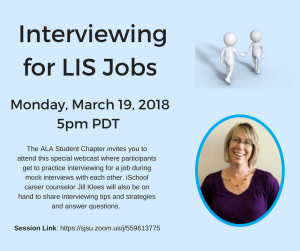by Brian McManus
Professional development does not start when you get your first librarianship after being newly minted from library school. It begins when you start your MLIS and begin to understand all the professional opportunities that are available. Not only librarians and other information professionals conduct research, write articles, and are committee members that contribute to the greater library world. MLIS students have all these same opportunities.
What follows is the information I accumulated for a poster presentation project in LIBR 230, Issues in Academic Libraries. I have added some more content for a more generalized librarianship instead of the academic specialization. Hopefully you will find the information helpful and have some new avenues of professional development to consider.
Advantages of Proactive Professional Development
There are advantages to proactively pursuing professional development opportunities while you are still in library school. These types of opportunities provide exposure to professional settings and conferences not offered through your employer or otherwise. Being proactive now allows you to offer more to a potential employer upon graduating library school than your degree by enhancing your resume and giving you more to potentially discuss at an interview. Also, it allows you access to individuals that may be willing to mentor you and it is a great way to find professional groups that share your professional interests outside of your school and employer.
Publishing Opportunities
Since you are in graduate school you are undoubtedly writing many papers and completing projects. Once you get your grade back on these assignments you can improve on them and possibly submit them as manuscripts to be published in a professional journal. This looks great on your resume/vita and it gets your name out there. There are a couple of ways to start publishing. The first place I would start looking for publishing opportunities is on the SJSU LIS Publications Wiki. This wiki gathers information about publications that LIS professionals might want to write for. All editors, publishers, and LIS professionals are welcome to contribute to the publication profiles, after all it is a wiki. You can participate by creating a free account and logging in.
Other avenues to consider for publishing your work are presentations at conferences, poster presentations, and blogs. You have to keep an eye out for CFP’s, call for papers. These are basically solicitations by professional journals and conference organizers for professionals to submit content related to their specific, respective topics of coverage. CFP’s are typically distributed via email listservs and blogs. Joining listservs and using an RSS feeder to capture dedicated CFP blogs are excellent ways to be notified and greatly increase your chances of getting your name out there as a serious information professional.
More Suggestions:
One CFP blog to follow or read is Dolores’ list of CFP’s. This site shares calls for papers and presentations in Library Sciences and related fields. It is also a place to find advice about writing, publishing, and presenting.
Some listservs to join for CFP’s via the American Library Association, which may require membership, are the College Libraries Section List (collib-l@ala.org), the New Members Round Table Discussion List (nmrt-l@ala.org), and the New Members Round Table New Writers List (nmrtwriter@ala.org).
Professional Library Associations
One of the most beneficial actions MLIS students can take is joining a professional library association. By joining you are taking the first steps in being proactive with your professional development. There are many to pick from on SJSU SLIS’s professional associations page. The one I have had great success with is the American Library Association (ALA). The ALA is a great place to start experimenting with joining and interacting with the different aspects of librarianship you are interested in. The association has a New Members Roundtable (NMRT) that is specifically for, you guessed it, new ALA members. The roundtable organizes social events and keynote speakers for the ALA national conferences making these events a great place to introduce yourself and meet like-minded colleagues. You should definitely join NMRT if you are an ALA member.
Involvement
Generally, state, regional, and national library associations depend on their members to help run and administer their organizations. The types of activities these organizations allow their members to participate in range from hosting online discussion forums, which require no travel, to helping plan and implement their annual meetings. There are a wide range of activities that library associations need membership involvement for and without the inclusion of their members the associations would be extremely static organizations.
Also, getting involved with at least one library organization allows members to gain a much richer perspective of the issues libraries face and it in turn makes the member’s experience richer. Below is a brief list of links for volunteer and involvement opportunities with national library organizations. The forms do not typically take long to fill out, however the notification process can take some time.
ALA Involvement:
• This page gives a brief description of the volunteer process for joining ALA committees. Many of these are constantly looking for new people to add to their ranks, so they are very open to accepting new people for posts in their groups.
ACRL Volunteer Opportunities
• This page discusses the deadlines and the volunteer process for joining ACRL committees, task force, discussion group, editorial boards. Many of these different groups are constantly looking for new people to add to their ranks, so they are very open to accepting new people for posts in their groups.
SJSU Professional Association List
• This is a list of professional associations provided by the SJSU SLIS program. Check their sites for volunteer and involvement opportunities.
Professional Journals
Reading professional journals allow SLIS students to keep up with current issues and trends in the field they are studying. These types of journals only add to a student’s experiences, allow students to be exposed to the profession more in depth than reading their textbooks, and reading them only enhances their education. Below are online library journals and their Web sites. There are many more, but these are a great start.
College & Research Libraries (CRLNews), Published by the Association of College & Research Libraries, http://crln.acrl.org/
Generally
Gaining these professional experiences allow you to experiment with different aspects of the library specialty you are most interested in. One of the most rewarding aspects of professional development opportunities is that it allows the participant to internalize what they experience, for example the opportunity to present at a conference. I know most people do not enjoy public speaking (I am one of them), however it affords much more learning than just polishing those presentations skills, “student presentations promote creativity and critical thinking skills, encourage collaborative learning, refine communication skills, develop enthusiasm for scholarly pursuits, and develop feelings of competence” (Jurkowski et al., 2005, P.199-200)*. I agree with Jurkowski et al. and would add that by participating in conference presentation activities MLIS students show they can stand with other library and information professionals and make significant scholarly contributions. The Jurkowski et al. article is a good read although it is a little dated. See the references list below for the citation.
There are many opportunities for SLIS students to participate within the library profession. These opportunities can be found at individual libraries where a SLIS student may work or volunteer. Also these opportunities can be found within state, regional, and national professional associations. Involvement in professional associations is likely to be most beneficial since volunteerism is greatly encouraged and the associations are only as strong and effective as their membership. Professional development should be a consideration for every SLIS student since it covers maintaining and learning new essential skills, gaining a more well-rounded perspective of library issues and trends, and it allows SLIS students to make connections and network with other library professionals.
*Jurkowski, O., Antrim, P., & Robins, J. (2005). Building Bridges Between Students and Practitioners. Journal of Education for Library and Information Science, 46(3), 198-209. Retrieved October 25, 2010, from Library Lit & Inf Full Text database.
Brian McManus is a Library Archives Paraprofessional in Access Services at the Holland & Terrell Libraries on the main campus of Washington State University. He received his B.A. in Finance in 1999 and another B.A. in Criminal Justice in 2006, both from Washington State University. He has been a graduate student enrolled in SJSU’s SLIS program since 2009 and plans to graduate in 2012, where his professional interests are currently leaning toward academic and digital services librarianships. Brian enjoys working on library committees and task forces, such as those related to scholarly communication and open-access initiatives, and is generally enthusiastic about working with technology.



